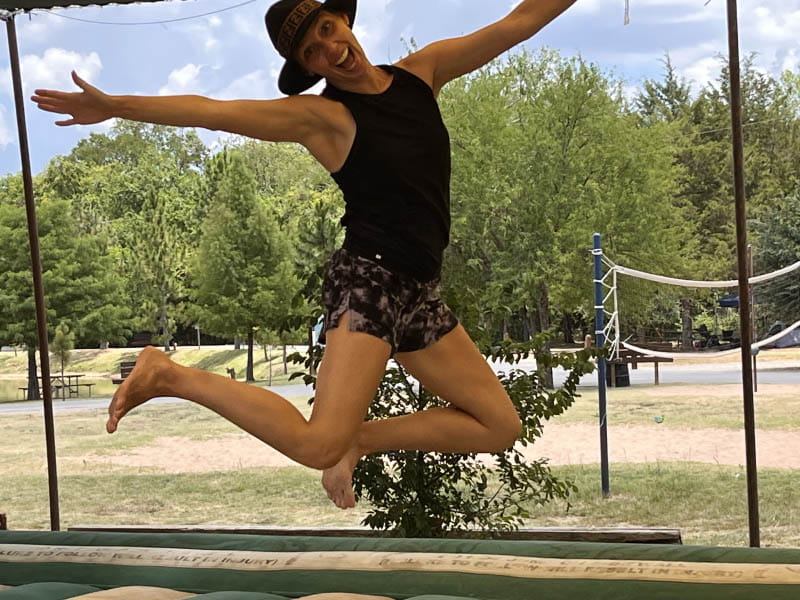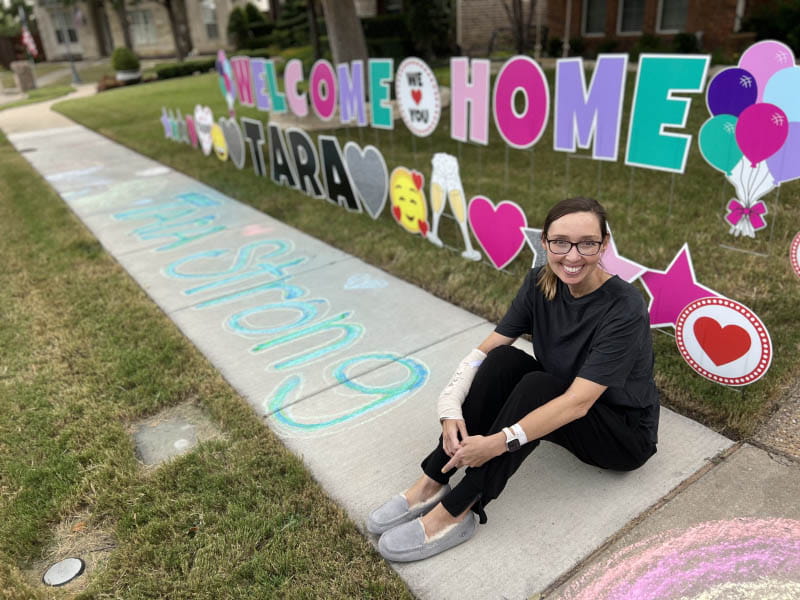During family vacation, 39-year-old mother's heart stopped at a water park
By Diane Daniel, American Heart Association News

During a Fourth of July weekend with their two children, Tara and Tyler Yell visited a water park about 90 minutes from their home in Frisco, Texas.
The parents joined their daughter, Emerson, then 10, and son, Declan, 4, on rides and slides, laughing and splashing. Suddenly Tara started to feel dizzy and sick. Her heart raced.
For the first time since she'd received what she calls her "panic pills," Tara decided she needed one.
The beta blockers were prescribed two years earlier, in 2020, after she'd felt her heart beating fast while she was at work teaching first graders.
She was diagnosed with supraventricular tachycardia, or SVT, a condition where the heart can beat abnormally fast due to faulty electrical signals. Doctors weren't concerned and prescribed beta blockers for Tara to take if it happened again.
In the spring of 2022, she had a few episodes that were minor enough that she didn't feel medication was needed. Her vision would sometimes fade out but quickly return. Still, that June, after the school year ended, Tara saw a cardiologist.
The doctor told her that because she was healthy, active and 39, the issue was likely stress-related. That didn't sit well with Tara, who was known for her chill personality.
Indeed, this episode at the water park, less than a month after she'd seen the doctor, came when she felt completely relaxed and happy.
Tyler offered to grab the medication from their camper.
"I don't think you should leave me alone with the children," Tara said.
That's when Tyler knew it was serious. They decided to go straight home.
Tara wanted to stop at the restroom first.
Tyler noticed his wife was walking a little unevenly on her way there.
"Hey Emerson, will you keep an eye on your mother?" Tyler said. He stayed with Declan and packed up their belongings.
Less than a minute later, Emerson was running back yelling, "Mom's on the ground."
Tyler found Tara collapsed inside a locked stall. He climbed over the top to unlock it and pulled Tara out. She wasn't breathing.
He yelled for help, and a lifeguard came running. She immediately started to give Tara chest compressions.
After a few minutes, firefighters arrived and took over. They connected her to an automated external defibrillator, or AED. The machine can help restart a heart that's stopped beating. The third shock of the AED triggered a sustainable rhythm.
In the ambulance, her heart stopped again and an AED again brought it back to life.
Tara had experienced cardiac arrest, which is caused by faulty electrical currents in the heart. She was placed in an induced coma to let her body heal from the trauma and in hopes of minimizing brain damage.
Three days later, as Tara was coming out of the coma, a neurologist warned Tyler that Tara's cognitive skills could be compromised. He feared the worst.
The next day, Tyler and Tara's best friend were in the room with her. One of them said, "Tara, we're here for you." And she blinked.
A pulmonologist was in the room. He urged Tyler to "give it all the gusto you have."
So Tyler yelled, "We and the kids love you! Let us know you're there!"
She blinked some more. They all hugged and cheered.

Three days later, the ventilator was removed, allowing Tara to breathe on her own.
Doctors were unable to determine what caused her heart to stop. It wasn't SVT; not only does that condition rarely trigger cardiac arrest, but doctors discovered she didn't actually have it. So something else was behind everything. To protect her from further episodes, she received an implantable cardioverter defibrillator, or ICD, in her chest to monitor her heart. If the device detects a problem, it can shock the heart back into a normal rhythm.
Tara struggled to regain her strength, motor skills and mental dexterity.
She started physical therapy after losing muscle, occupational therapy to perform daily functions and speech therapy to combat loss in memory and response times.
Tara's self-described "stubborn personality" helped, first in the hospital for more than two weeks and then for another 10 days at an inpatient rehabilitation facility.
"I'm competitive with myself, so I decided I was going to be the best rehab student," she said. "As I tell my own students, progress is progress. You just keep plugging away."
At home, Tyler's mother and aunt moved in to help the family out. Everyone joked that it took two of them to take Tara's place.
When Tara went home, she still had to learn to navigate stairs, meaning she couldn't go up to her children's bedrooms. Her new goals were to brush Declan's teeth and to put him and Emerson to bed.
"I wanted to take care of them again," she said.
For almost three months, she went to outpatient rehab for six hours a day, five days a week. Each morning, she left home carrying a backpack. Her mother-in-law dropped her off and her dad picked her up.
"It was like I was a kid again going off to school," she said, this first-grade teacher seeing the humor in her own setup.

She returned to work in December 2022, five months after her cardiac arrest.
She still struggles with fatigue and sometimes feels overwhelmed emotionally. She describes herself as "not the multitasker I once was, and my motions aren't as fluid." Still, she's back, and there's solace in that.
Tara and Tyler have found many meaningful ways to express their gratitude at her second chance at life.
They both learned CPR and encourage others to get trained.
"Just learn the moves," Tyler said.
More than anything, Tara and Tyler appreciate the medical care Tara received and the community that embraced them. On her second day home, friends, family and members of her school family staged a huge drive-by parade down her street.

Meanwhile, the family has set out on a quest to share their love of nature by visiting national parks. They hope to reach 15 by the end of this year.
Tara said they strive to live by the motto on the T-shirts she had made while raising money to help fight heart disease: "Enjoy every moment."
Stories From the Heart chronicles the inspiring journeys of heart disease and stroke survivors, caregivers and advocates.





